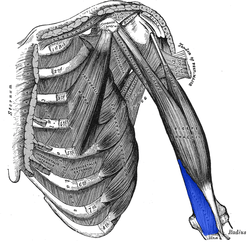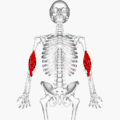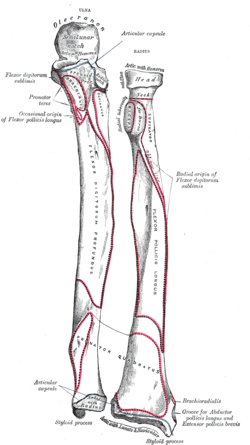Brachialis muscle
| Brachialis | |
|---|---|
 Deep muscles of the chest and front of the arm, with the boundaries of the axilla. (Brachialis visible at bottom right.) | |
 Position of brachialis (shown in red). | |
| Details | |
| Origin | anterior surface of the humerus, particularly the distal half of this bone |
| Insertion | coronoid process and the tuberosity of the ulna |
| Artery | radial recurrent artery |
| Nerve | musculocutaneous nerve (C5, C6) |
| Actions | flexion at elbow joint |
| Identifiers | |
| Latin | musculus brachialis |
| Dorlands /Elsevier | m_22/12548498 |
| TA | A04.6.02.018 |
| FMA | 37667 |
The brachialis (brachialis anticus) is a muscle in the upper arm that flexes the elbow joint. It lies deeper than the biceps brachii, and makes up part of the floor of the region known as the cubital fossa. The brachialis is the prime mover of elbow flexion. While the biceps brachii appears as a large anterior bulge on the arm and commands considerable interest among body builders, the brachialis underlying it actually generates about 50% more power and is thus the prime mover of elbow flexion.[1]
Structure
The brachialis originates from the anterior surface of the distal half of the humerus,[1] near the insertion of the deltoid muscle, which it embraces by two angular processes. Its origin extends below to within 2.5 cm of the margin of the articular surface of the humerus at the elbow joint. Its fibers converge to a thick tendon, which is inserted into the tuberosity of the ulna[2] and the rough depression on the anterior surface of the coronoid process of the ulna.
Variation
The muscle is occasionally doubled; additional slips to the supinator, pronator teres, biceps brachii, lacertus fibrosus, or radius are more rarely found. (A "slip" in this context refers to an accessory or variant part of a muscle that has an unusual trajectory in growth relative to the normal fibers' direction of growth.)
Innervation
The brachialis muscle is innervated by the musculocutaneous nerve, which runs on its superficial surface, between it and the biceps brachii.[2] However in 70-80% of people, the muscle has double innervation with the radial nerve (C5-T1). The divide between the two innervations is at the insertion of the deltoid.[3]
Arterial Supply
The brachialis is supplied by the Muscular branches of brachial artery and the recurrent radial artery.[4]
Function
The brachialis flexes the arm at the elbow joint.[2] Unlike the biceps, the brachialis does not insert on the radius, and does not participate in pronation and supination of the forearm.[2]
History
Etymology
The brachialis muscle [5] and brachial muscle [6] can be considered as the anglicized variant of the Latin expression musculus bracchialis.[7] In classical Latin bracchialis means of or belonging to the arm,[8] and is derived from classical Latin bracchium,"arm".[8] The expression musculus brachialis is used in the current official anatomic nomenclature Terminologia Anatomica.[9]
Additional images
 Position of brachialis (shown in red). Animation.
Position of brachialis (shown in red). Animation. Still image.
Still image. Horizontal section through the middle of upper arm. (Brachialis labeled at center left.)
Horizontal section through the middle of upper arm. (Brachialis labeled at center left.).jpg) Muscles of lower limb, including insertion of brachialis tendon. Cross section. (Brachialis labeled at bottom left.)
Muscles of lower limb, including insertion of brachialis tendon. Cross section. (Brachialis labeled at bottom left.) Left humerus. Anterior view.
Left humerus. Anterior view. Bones of left forearm. Anterior aspect.
Bones of left forearm. Anterior aspect. Nerves of the left upper extremity.
Nerves of the left upper extremity.- Brachialis muscle (labeled in green text)
See also
References
This article incorporates text in the public domain from the 20th edition of Gray's Anatomy (1918)
- 1 2 Saladin, Kenneth S, Stephen J. Sullivan, and Christina A. Gan. Anatomy & Physiology: The Unity of Form and Function. , 2015. Print.
- 1 2 3 4 Drake, Richard L.; Vogl, Wayne; Tibbitts, Adam W.M. Mitchell; illustrations by Richard; Richardson, Paul (2005). Gray's anatomy for students. Philadelphia: Elsevier/Churchill Livingstone. p. 662,672. ISBN 978-0-8089-2306-0.
- ↑ "Brachialis Muscle." Kenhub. Kenhub, Aug. 2001
- ↑ "Brachialis." UW Department of Radiology. University of Washington, Nov. 2005
- ↑ Dirckx, J.H. (Ed.) (1997).Stedman’s concise medical dictionary for the health professions. (3rd edition). Baltimore: Williams & Wilkins.
- ↑ Anderson, D.M. (2000). Dorland’s illustrated medical dictionary (29th edition). Philadelphia/London/Toronto/Montreal/Sydney/Tokyo: W.B. Saunders Company.
- ↑ Triepel, H. (1910). Die anatomischen Namen. Ihre Ableitung und Aussprache. Mit einem Anhang: Biographische Notizen.(Dritte Auflage). Wiesbaden: Verlag J.F. Bergmann.
- 1 2 Lewis, C.T. & Short, C. (1879). A Latin dictionary founded on Andrews' edition of Freund's Latin dictionary. Oxford: Clarendon Press.
- ↑ Federative Committee on Anatomical Terminology (FCAT) (1998). Terminologia Anatomica. Stuttgart: Thieme
External links
| Wikimedia Commons has media related to Brachialis muscles. |
- Illustration: brachialis from The Department of Radiology at the University of Washington
- Muscles/Brachialis at exrx.net